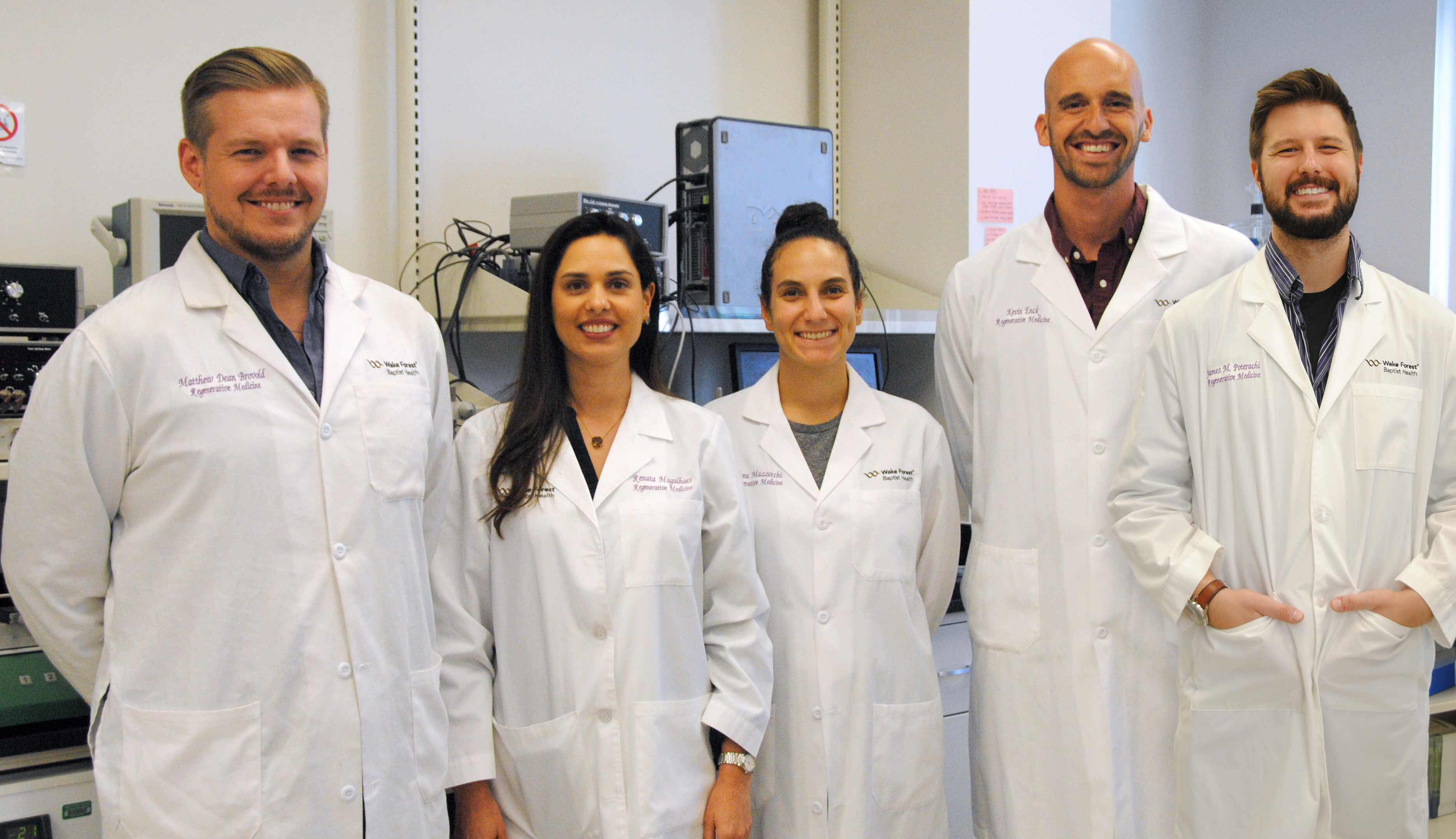
As Pictured: Class of 2018-2019 Fellows: Matthew Brovold, Renata Magalhaes, Andrea Mazzocchi, Kevin Enck, James Poteracki
Use the jump navigation below to move between the former fellows.
Hannah Besser Baker, BME Track
September 2013 - June 2015
Mentors: G. Christ, PhD and A. Mohs, PhD
Focus: TE/RM Solutions for Functional Reconstruction of VML Injuries
Hannah was involved in the study of tissue engineering/RM solutions for functional reconstruction of volumetric muscle loss (VML) injuries. Her research was funded by a diversity of sources including and internal Innovation Award for development and commercialization of the tissue engineered muscle repair (TEMR technology), and external funding from the Armed Forces Institute of Regenerative Medicine (AFIRM). The TEMR technology is funded by AFIRM for a pilot clinical study on 5 patients undergoing secondary revision of cleft. Her project involves development of biomaterial and bioreactor strategies for functional restoration of surgically created VML injuries analogous to the permanent VML injuries suffered by civilians and wounded warriors. She is presently focused on the use of rodent models for finalizing the applicability of the TEMR technology for cleft lip.
Hannah successfully completed her T32 training appointment and defended her thesis on June 15th, 2015. Consistent with Hannah’s goal is to stay closely involved with translational science by continuing to pursue research endeavors in musculoskeletal regeneration and by becoming more involved with the associated regulatory processes and policy, she submitted applications to a variety of postdoctoral positions in tissue engineering research labs as well as to the American Institute for Medical and Biological Engineering Scholars Program. On March 17th, 2015 she accepted a Post-Doctoral Fellow position at the University of Maryland under the primary advisement of Dr. John P. Fisher in the Bioengineering Department working on tissue engineered therapies for orthopedic tissues. Simultaneously, her postdoctoral appointment included training at the FDA in Silver Spring, MD. Hannah completed her postdoctoral fellowship in March 2018. In April 2018, Hannah was recruited and accepted a position as Research Scientist at ACell, Inc., where she is responsible for participating in all aspects of basic and applied research for early-stage development of medical devices at ACell in compliance with the FDA Quality System Requirement.
Publications
- Benjamin T. Corona, Ph.D., Catherine L. Ward, Ph.D., Hannah B. Baker, Thomas J. Walters, Ph.D., George J. Christ, Ph.D. Implantation of in vitro tissue engineered muscle repair (TEMR) constructs and bladder acellular matrices (BAM) partially restore in vivo skeletal muscle function in a rat model of volumetric muscle loss (VML) injury. Tissue Engineering Part A 2014; 20(3-4): 705-715. PMCID: 45188882.
- Baker HB, McQuilling, JP, King, NM. Ethical Considerations in Tissue Engineering Research: Case Studies in Translation. Methods (San Diego, Calif.). 2016 April 15; 99:135-44. PubMed PMID: 26282436; PubMed Central PMCID: PMC4869966.
- Baker HB, Passipieri JA, Siriwardane M, Ellenburg MD, Vadhavkar M, Bergman CR, Tomblyn S, Burnett L, Christ, GJ. Cell and Growth Factor Loaded Keratin Hydrogels for Treatment of Volumetric Muscle Loss (VML) in a Mouse Model. Tissue Engineering Part A 2017 Jun; 23(11): 572-574. PMID: 28162053.
- Kuo CY, Baker HB, Fries MH, Yoo JJ, Kim PCW, Fisher JP. Bioengineering Strategies to Treat Female Infertility. Tissue Engineering Part B Rev. June, 2017 23(3):294-306. doi: 10.1089/ten.TEB.2016.0385.
- Passipieri JA, Baker HB, Siriwardane M, Ellenburg MD, Vadhavkar M, Saul JM, Tomblyn S, Burnett L, Christ GJ. Keratin Hydrogel Enhances In Vivo Skeletal Muscle Function in a Rat Model of Volumetric Muscle Loss. Tissue Engineering Part A. June, 2017; 23(11-12):556-571.
- Piard C, Baker HB, Kamalitdinov T, Fisher JP. Bioprinted osteon-like scaffolds enhance in vivo neovascularization. Biofabrication. Feb, 2019 doi: 10.1088/1758-5090/ab078a. PMID: 30769337
- Guo T, Noshin M, Baker HB, Taskoy E, Meredith SJ, Tang Q, Ringel JP, Lerman MJ, Chen Y, Packer JD, Fisher JP. 3D printed biofunctionalized scaffolds for microfracture repair of cartilage defects. Biomaterials. Dec, 2018. 185:219-231. doi: 10.1016/j.biomaterials.2018.09.022.
- Guo T, Ringel JP, Lim CG, Bracaglia LG, Noshin M, Baker HB, Powell DA, Fisher JP. Three dimensional extrusion printing induces polymer molecule alignment and cell organization within engineered cartilage. J Biomed Mater Res A. Aug, 2018. 106(8):2190-2199. doi: 10.1002/jbm.a.36426.
- Kuo CY, Guo T, Cabrera-Luque J, Arumugasaamy N, Bracaglia L, Garcia-Vivas A, Santoro M, Baker HB, Fisher J, Kim P. Placental basement membrane proteins are required for effective cytotrophoblast invasion in a three-dimensional bioprinted placenta model. J Biomed Mater Res A. 2018 Jun;106(6):1476-1487. doi: 10.1002/jbm.a.36350.
- Passipieri J, Hu H, Mint E, Diene J, Baker, HB, Hunter Wallace C, Blemker, SS and Christ GJ. In Silico and In Vivo Studies Detect Functional Repair Mechanisms in a Volumetric Muscle Loss Injury. Tissue Engineering Part A. Vol. 25, No. 17-18. Published Online: 17 Sep 2019, doi: 10.1089
Oral Presentations
Baker, HB. (October 2013). Keratin hydrogels as a delivery system for the regenerative treatment of volumetric muscle loss. NCTERMS Conference, Winston-Salem, NC. 2013.
Baker HB, Passipieri, JA, Bergman, C. (February 2014). Skeletal muscle tissue engineering and the RMCC. 2014 WFIRM Annual Retreat, Pinehurst, NC.
Baker HB. (October 2014). Keratin hydrogels as a cell and growth factor delivery vehicle for treatment of volumetric muscle loss. BMES Conference, San Antonio, TX.
Baker, HB (December 2014). Growth Factor Loaded Keratin Hydrogels for Treatment of a Sheet-like VML Injury in Mice. TERMIS Americas, Washington, D.C.
